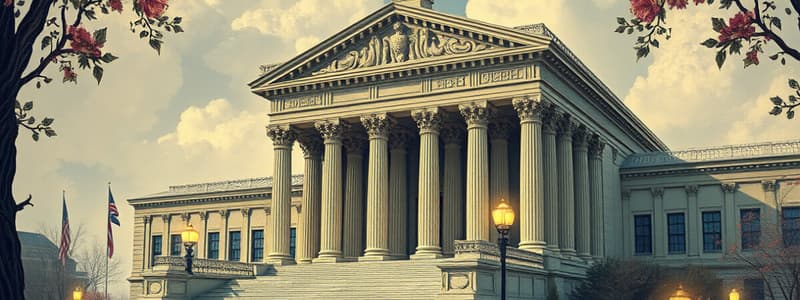Podcast
Questions and Answers
What is federalism?
What is federalism?
A system in which power is divided between the national and state governments
What are unitary governments?
What are unitary governments?
A way of organizing a nation so that all power resides in the central government.
What are intergovernmental relations?
What are intergovernmental relations?
The workings of the federal system involving interactions among national, state, and local governments.
What is the Supremacy Clause?
What is the Supremacy Clause?
What does the 10th Amendment state?
What does the 10th Amendment state?
What was the significance of McCulloch v. Maryland?
What was the significance of McCulloch v. Maryland?
Define enumerated powers.
Define enumerated powers.
What are implied powers?
What are implied powers?
What is the Elastic Clause?
What is the Elastic Clause?
What was the outcome of Gibbons v. Ogden?
What was the outcome of Gibbons v. Ogden?
What is the full faith and credit clause?
What is the full faith and credit clause?
What is extradition?
What is extradition?
What are privileges and immunities?
What are privileges and immunities?
What is dual federalism?
What is dual federalism?
What is cooperative federalism?
What is cooperative federalism?
What is fiscal federalism?
What is fiscal federalism?
What are categorical grants?
What are categorical grants?
What are project grants?
What are project grants?
What are formula grants?
What are formula grants?
What are block grants?
What are block grants?
What is the Commerce Clause?
What is the Commerce Clause?
Flashcards are hidden until you start studying
Study Notes
Key Concepts of Federalism
- Federalism: Power is shared between national and state governments, allowing for a division of responsibilities and authority.
- Unitary Governments: Centralized power structure where all authority is held by the national government; prevalent in many countries today.
Intergovernmental Relations
- Intergovernmental Relations: Refers to the interactions between national, state, and local governments within the federal system.
Constitutional Provisions
- Supremacy Clause: Establishes that the Constitution and federal laws take precedence over state laws when the federal government acts within its constitutional authority.
- 10th Amendment: Reserves powers not granted to the federal government for states or the people, defining the limits of federal authority.
Landmark Supreme Court Cases
- McCulloch v. Maryland: A 1819 Supreme Court decision affirming implied powers and establishing the supremacy of national government authority.
- Gibbons v. Ogden: A significant 1824 ruling emphasizing Congress's exclusive right to regulate interstate commerce, reinforcing national authority.
Types of Powers
- Enumerated Powers: Specific powers granted to Congress, such as taxation, currency regulation, and war declaration.
- Implied Powers: Powers not explicitly stated but inferred from the necessary and proper clause, enabling Congress to implement its functions effectively.
- Elastic Clause: Allows Congress to make laws deemed necessary and proper for executing its enumerated powers.
Interactions Between States
- Full Faith and Credit: States must honor the public acts, records, and judicial proceedings of other states, promoting legal uniformity and respect.
- Extradition: Legal process that allows a state to transfer an accused individual to another state where the crime was committed.
- Privileges and Immunities: Ensures that citizens of each state receive the same privileges as citizens of other states, prohibiting discrimination.
Federalism Models
- Dual Federalism: Divides responsibilities clearly between federal and state governments; characterized as "layer cake" federalism.
- Cooperative Federalism: Federal and state governments collaborate on various functions, likened to "marble-cake" federalism; prevalent in contemporary governance.
- Fiscal Federalism: Describes the financial relations between government levels, influenced by various grant programs that complicate jurisdictional roles.
Types of Grants
- Categorical Grants: Federal funds allocated for specific purposes with restrictions, often requiring particular compliance (e.g., anti-discrimination).
- Project Grants: Competitive funding provided to states and localities based on submitted project proposals.
- Formula Grants: Non-competitive funding distributed based on a predetermined formula relative to state needs.
- Block Grants: Broad federal funds allocated to states or communities with fewer restrictions, supporting general program areas like community development.
Commerce and Federal Authority
- Commerce Clause: Grants Congress the power to regulate commerce across state lines and with other nations, a cornerstone of federal economic authority.
Studying That Suits You
Use AI to generate personalized quizzes and flashcards to suit your learning preferences.




